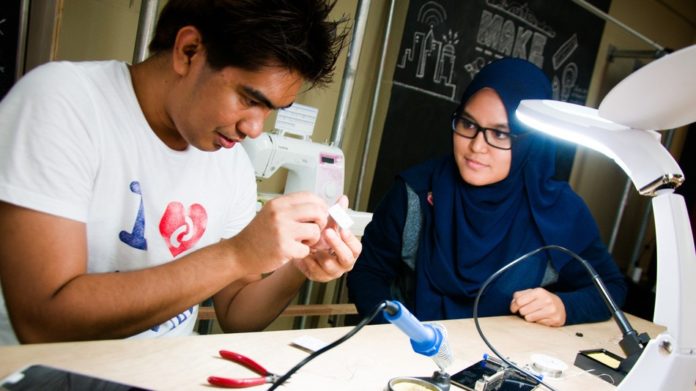5 amazing healthcare innovations coming out of Singapore

Thanks to world-class hospitals, an emphasis on public/private partnerships and increased investment in med-tech startups, the world’s biotech community has grown accustomed to calling Singapore the “Boston of Asia,” an allusion to the North American city’s robust medical and engineering sectors.
Between 2011 and 2015, in fact, Singapore gave $11.2 billion to support research, innovation and enterprise projects, according to the country’s Economic Development Board.
With those funds, resources and support, Singaporean medical and healthcare innovators have tackled local issues and exported global solutions.
Here are five discoveries and innovations that Singapore is sharing with the world’s medical and scientific communities.
1. Researchers in Singapore built a video game headset to help children with ADHD focus
Licensing technology developed by researchers at the Institute for Infocomm Research in Singapore, Boston-based company Atentiv hopes to strengthen focus in adolescents through a video game experience. The company’s first product, set to launch this year, measures brain activity through a headband and sends that information back to a computer via Bluetooth.
The Singaporean technology is able to hone in on mental activity related to attention rather than memory, making it unique compared to other brain-reading games. The child’s attention level, which is displayed on the screen, determines how quickly their character moves in the corresponding computer game.
Initial studies of the technology in Singapore, conducted after eight weeks of game play, revealed a 40% decrease in symptoms like impulsivity and inattention in children with mild to moderate ADHD, Crain’s reported.
2. Singaporean startup Healint is making it easier to track migraines and share symptoms with your doctor

Image: Flickr, R. Nial Bradshaw
Anyone who experiences frequent migraines can tell you how debilitating — and difficult to keep track of — they can be. Because tracking and communicating attack symptoms is essential to treating migraines, Singaporean startup Healint has built a platform and an app, Migraine Buddy, to give patients one easy-to-use interface to monitor all of their symptoms and related information, like intensity, triggers, medications and other lifestyle factors.
Recently, Healint built a sleep-detection algorithm into Migraine Buddy. It automatically tracks users’ snooze time and correlates that and other behaviors with data about when migraines occur to better predict attacks.
Eventually, Healint hopes to be able to track and report flare-ups for conditions like asthma, epilepsy and spinal stenosis.
3. Singaporean doctors developed Asia’s first test for a genetic eye disease
Asian patients no longer have to follow a wait-and-see approach when it comes to predicting and treating corneal stromal dystrophy, a debilitating, genetic eye disease that inflicts blurred vision and violent corneal pain.
In July, teams of Singaporean researchers working together under the aegis of Singapore’s Agency for Science, Technology & Research announced that the new Polaris-TGFBI test can definitively test for the disease in Singapore, allowing patients to begin early treatment plans without having to send away for expensive tests that take weeks, and possibly months, to return.
Importantly, the new exam can inspect the TGFBI gene, especially among people with a family history of corneal stromal dystrophy, to discover harmful mutations.
4. OSPICON is designing smart mats to care for infants and the elderly

Image: Flickr, Dave Herholz
For infants, healthy and abundant sleep is vitally important, ensuring that they’re able to rest, grow and develop during the first few months of their lives.
Many parents lose sleep themselves during these months worrying that their newborns aren’t sleeping properly. The OSPICON sleep mat tempers their concerns by monitoring a baby’s breathing pattern using fiber optic sensors, communicating information — and any irregularities — via a smart app. Throughout the night, the mat also notes the child’s breathing to create a sleep log.
Doctors at Singapore’s largest hospital for babies studied the mat and found it to be reliable and accurate compared with manual breath counts conducted by a clinician.
Building off of its success monitoring infants’ respiration, OSPICON is developing devices to monitor the sleep of elderly patients.
5. Caregivers have a new app to monitor seniors who live alone
In a trial conducted by Singapore’s Housing and Development Board, a dozen elderly Singaporean households said they supported a smart monitoring system for the elderly.
Called the Smart Elderly Monitoring and Alert System, the trial program installed motion sensors in seniors’ homes to initially study their living patterns, like how much time they normally spend in a certain area of their residence. By picking up on patterns, the system’s algorithm is able to detect aberrations, such as when a person might be in bed or in the bathroom for an abnormally long period of time.
If the system picks up on an anomaly, it sends a text message to the senior’s caregiver.
With such amazing medical advancements already in the works, it’s an exciting time for medical and technological advancements Singapore; in the coming weeks, months and years, we can only imagine what impactful and innovative technologies will emerge from the region, which is quickly becoming a global player in healthcare innovation.
For healthcare professionals and anyone intrigued by the medical innovations coming out of Singapore and Southeast Asia, here are a couple of upcoming events worth attending in the coming weeks and months:
- The ISMRM Annual Meeting: This event, hosted by the International Society for Magnetic Resonance in Medicine, will take place on May 7-13, 2016 at the Suntec Singapore Convention & Exhibition Center.
- SpineWeek: Singapore has one of Southeast Asia’s largest spine centres within the Singapore General Hospital. This event will feature the latest developments in multidisciplinary spine care education, research and innovation. SpineWeek is one of the biggest spine meetings in the world; it will take place May 16-20
